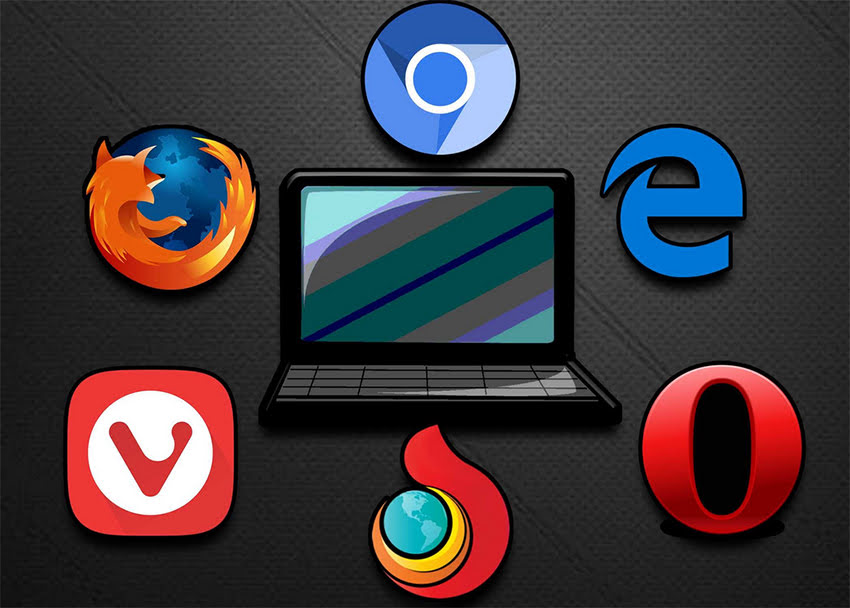5 Best & Fastest Web Browsers in: Slow browsers are not just frustrating—they can also be risky. A sluggish web client often relies on outdated technology, struggles to load modern websites, and may be more vulnerable to security threats that newer browsers have patched. And yes, let’s be honest: using a slow browser is just plain annoying.
To help you avoid these issues, I’ve put together a list of the 5 fastest web browsers, based on my hands-on testing. I evaluated each one for overall speed, how efficiently it uses system resources, and how easy it is to install, use, and customize.
Unsurprisingly, Google Chrome topped the charts in terms of speed. While it does demand a fair bit of system memory, its V8 JavaScript engine and streamlined memory management make it incredibly fast—even with 30+ tabs open (yes, I tested that). Still, several other browsers came close in performance, so you’ve got some great alternatives to choose from.
The Amazon FireStick is an incredibly powerful streaming device that has revolutionized the way we watch TV. Even if you don’t own a Smart TV, simply plug the FireStick into any HDMI port, and it instantly transforms your regular TV into a smart one with access to a wide range of streaming services. To take your FireStick experience to the next level, using a VPN is highly recommended. A FireStick VPN helps you bypass geo-restrictions and ISP throttling, ensuring uninterrupted and buffer-free streaming. Using a VPN with FireStick brings significant benefits, and one of the top options is ExpressVPN. This VPN offers excellent performance, strong encryption, and access to global content libraries. No matter where you are, ExpressVPN ensures a seamless, high-speed streaming experience with top-notch privacy protection. Plus, they offer a 30-day money-back guarantee, so you can try it risk-free. If for any reason you're not satisfied (though it’s highly unlikely), you can get a full refund. With ExpressVPN on FireStick, you can enjoy your favorite shows and movies without any interruptions or concerns. Experts Recommended:
1. Google Chrome — The Fastest Browser With Exceptional Performance Capabilities
In my testing, Google Chrome consistently ranked as the fastest browser available. Built on the Blink rendering engine and powered by the V8 JavaScript engine, Chrome handles complex data and script-heavy websites effortlessly, with no noticeable performance drops. Its efficiency with JavaScript-heavy pages is particularly impressive.
Chrome is also at the forefront of browser technology, which allows it to navigate modern, complex websites more smoothly than any other browser. Features like hardware acceleration help it load pages quickly and switch between tabs seamlessly, even under heavy usage.
Disclaimer
The following list is for educational purposes only. Firesticktricksapps does not create, own, host, run, manage, sell, or distribute any streaming apps, add-ons, websites, IPTV, or services. We also don’t earn commissions from featuring these services on our site. Our goal is to review and give an honest opinion from the end-user’s point of view to help people decide if these services are useful.
We cannot verify whether the services mentioned have legal licenses to distribute content everywhere. It’s up to our readers to make sure they are using these media services in line with the copyright laws of their countries. Firesticktricksapps assumes that all users are following the copyright rules in their region.
It also employs the experimental QUIC protocol (which it shares with Opera) to overcome some limitations of HTTP/2. This protocol not only improves connection speeds but also encrypts your data and minimizes packet loss. In simpler terms, Chrome’s architecture helps it tackle compatibility issues with certain advanced websites while keeping your browsing secure and snappy.
Another standout feature is Chrome’s deep integration with Google’s ecosystem. You can sync bookmarks, history, passwords, and open tabs across devices, making it easy to jump from desktop to mobile without losing your place. It’s not a direct speed increase, but it’s definitely a big time-saver.
The user interface is clean and straightforward—minimalist but highly functional. It’s easy to navigate, and you can personalize it with themes, switch to battery-saver mode for extended browsing, and tweak settings to suit your style.
2. Mozilla Firefox — Excellent Performance With Smart Memory Management
I’ve always had a soft spot for Firefox, so I was glad to see it hold its own in my tests. While it was just a touch slower than Google Chrome on average, there were cases where Firefox actually loaded some websites faster—largely thanks to its strong anti-tracking features. These not only block intrusive trackers and scripts from running but also cut down on the time and resources needed to fully load a page.
Privacy is where Firefox really shines. By preventing third-party trackers and cookies from loading, it gives you faster, cleaner access to websites—and better protection from data collection. But that’s just one part of its security-first design. Firefox is widely regarded as one of the most secure browsers available.
Performance-wise, Firefox benefits from its multi-process architecture, which divides tasks across multiple processors to reduce strain on your system. This means better speed and lower memory usage, especially when running several tabs or complex websites.
The interface is clean and user-friendly, making it a great choice for beginners. For power users, Firefox offers a wide range of customization options—like themes, extensions, and performance tweaks. You can even adjust its settings to better suit older hardware, making it a top pick for low-end PCs or mobile devices.
That said, Firefox’s biggest limitation is its extension library. Since it’s not Chromium-based, it doesn’t support the full range of Chrome extensions. Still, it has more than Safari and plenty to choose from for everyday use.
3. Microsoft Edge — A Modern, Chromium-Based Browser That Handles Heavy Sites Well
Microsoft Edge turned out to be faster than I expected, shedding the outdated reputation of its Internet Explorer roots. Built on the same Chromium engine as Chrome, it’s fast, modern, and more capable than many people give it credit for.
One standout feature is Startup Boost, which pre-loads Edge when you start your computer. This means it launches instantly—even with multiple tabs—giving you a quick start without the lag. Since Edge is pre-installed on most Windows systems, you can get online right away without needing to install anything extra.
I also liked the built-in battery-saving mode, which limits background processes to extend battery life. While it’s designed to save power, this feature also contributes to smoother performance during long browsing sessions.
Edge includes a native ad blocker that works decently well (though I still prefer Opera’s). Since ads can significantly slow down website loading times, having this built-in feature helps give Edge a speed boost.
Its interface is sleek and beginner-friendly, though very similar to Chrome’s, so it won’t feel unfamiliar. It also supports most Chrome extensions, giving you a lot of flexibility—just not quite as much as Chrome itself.
Best VPN For Streaming
1. ExpressVPN — Best VPN With the Fastest Speeds for Smooth Streaming

| Best Feature | The fastest speeds we tested, ensuring you can stream, browse, game, and torrent without interruptions |
| Server Network | 3,000 servers in 105 countries give you fast worldwide connections |
| Simultaneous Device Connections | Up to 8, so you can protect your compatible devices under one subscription |
| Works With | Netflix, Disney+, Amazon Prime Video, BBC iPlayer, (HBO) Max, Hulu, Vudu, DAZN, and more |
2. NordVPN — Best VPN With the Fastest Speeds for Smooth Streaming


| Best Feature | High security features and fast speeds for a reliable connection |
| Server Network | 5,400 servers in 60 countries for improved accessibility and connection speeds |
| Simultaneous Device Connections | Up to 6 devices, suitable for protecting multiple devices simultaneously |
| Works With | Netflix, Disney+, Amazon Prime Video, BBC iPlayer, (HBO) Max, Hulu, Vudu, DAZN, and more |
4. Opera — Fast Performance With Built-In Data Saver and Ad Blocker
Opera is a fantastic browser straight out of the box, thanks to its Chromium foundation (the same engine powering Chrome and Edge). During my testing, it delivered strong performance, handling multiple tabs and complex websites with ease and minimal strain on system resources.
Where Opera really stands out, though, is in its built-in features. Both its desktop and mobile versions (including Opera Mini) come with native data compression tools, which speed up load times by reducing the size of web pages. This makes it a particularly strong choice for mobile browsing or slower connections. Add to that its battery saver mode, which extends performance during longer sessions, and you get a browser that’s designed for efficiency.
Turning on Opera’s integrated ad blocker also gives a noticeable speed bump. Since ads can make up anywhere from 20% to 50% of a site’s load time, blocking them cuts down on wait time considerably. On ad-heavy sites, Opera even outpaced Chrome in a few of my tests (though Chrome was still the overall speed leader).
Opera also gets points for usability. Its customizable sidebar and pop-out video player are intuitive and convenient. While these features don’t directly affect speed, they enhance the overall browsing experience and streamline access to frequently used tools.
However, Opera does have one key downside: it doesn’t keep up with the latest web technologies quite as aggressively as Chrome. This can occasionally lead to compatibility issues, especially on sites that rely heavily on modern JavaScript frameworks.
5. Safari — Best Performance for Mac & iOS Users
If you’re using Apple devices, Safari is a great default browser that combines speed, privacy, and Apple-specific optimizations. While it doesn’t quite match the raw speed of Chromium-based browsers like Chrome or Edge, Safari is still very fast for everyday tasks, especially within the Apple ecosystem.
Safari’s strength lies in its seamless integration with macOS and iOS. Its architecture is finely tuned for Apple hardware, allowing it to run efficiently and deliver good performance without draining your device’s battery. It also includes robust privacy protections—like intelligent tracking prevention—that not only keep your data safe but can also help speed up page loads by blocking unnecessary scripts.
The user interface is minimal and extremely easy to navigate, making it ideal for beginners. If you’re new to browsing, Safari offers a simple layout and helpful tutorials to get you started.
However, Safari isn’t without its limitations. It’s the slowest browser on this list when it comes to heavy multitasking. If you have dozens of tabs open or are switching between apps, you may notice it slowing down. It also has the fewest customization options, with a smaller selection of extensions and themes compared to Chrome, Firefox, or even Edge.
Testing Methodology: How I Ranked and Compared the Fastest Browsers
Here’s the process I used to determine which browsers made the cut—and why they deserve to be on this list:
- Speed: First and foremost, I focused on how quickly each browser could handle demanding tasks, like loading content-heavy sites and juggling multiple tabs. Chrome came out on top in raw speed, but every browser I chose performed reliably, with only a 1–2 second difference on most websites.
- Memory Usage: While high-end PCs can handle heavy memory loads, not everyone has access to that kind of hardware. I prioritized browsers that manage memory efficiently, making sure they work smoothly on both top-tier machines and lower-end setups.
- Privacy and Customization: Believe it or not, good privacy tools actually speed up your browsing experience. Blocking trackers and third-party scripts lightens the load on your browser. All of my top picks include private browsing modes and tracker-blocking features. Opera stands out here with a built-in ad blocker and VPN—though enabling the VPN does slightly reduce speed.
- Extensions and Add-ons: Add-ons are essential for tailoring your browser to your needs. Chrome leads the pack with its massive library of extensions, many of which improve speed (like ad blockers or script managers). The browsers on my list all support extensions to some degree, giving you room to customize your experience.
- Ease of Use: Each browser here is easy to install and intuitive to navigate. You won’t run into confusing settings or hidden costs—just a quick setup and smooth browsing right from the start.
What Actually Makes a Browser Fast?
A browser’s performance depends on a lot of complex, behind-the-scenes factors. Here are the core elements that determine speed:
- Efficient Rendering Engine: This is the heart of your browser. Engines like Chrome’s V8 or Firefox’s Quantum determine how quickly and smoothly content is processed and displayed. Even the best internet connection won’t help if the engine is sluggish.
- Memory Management: Good browsers distribute system resources efficiently, preventing slowdowns—especially important when juggling multiple tabs or using older hardware.
- JavaScript Optimization: Since modern websites rely heavily on JavaScript, a browser with an optimized engine will handle these sites much faster. Chrome, for instance, was built with JavaScript in mind, giving it an edge with dynamic and interactive pages.
- Data Compression & Caching: Speed is also influenced by how well a browser stores frequently visited content and compresses data to reduce load times. Opera, for example, uses built-in data compression to load pages faster, especially on mobile.
- Hardware Acceleration: By offloading graphics and animations to your GPU instead of your CPU, hardware acceleration boosts performance. That said, over-reliance can drain system resources—so good browsers strike the right balance.
- Frequent Updates: A browser that receives regular updates stays compatible with the latest web standards, adds performance enhancements, and patches security issues. Outdated browsers tend to be slower and more vulnerable over time.
In short, a fast browser is more than just one that opens a page quickly—it’s one that’s optimized under the hood, stays up to date, and uses your system resources wisely.
Best VPN For Firestick Free Trial


Best overall VPN with a free trial
ExpressVPN
Privacy protection and transparency
Show our expert takeWhy Having a Fast Browser Matters
There are plenty of good reasons to use a fast browser, but they all come down to one key benefit: it makes your online experience smoother and more convenient. Unless you enjoy staring at loading screens, there’s really no downside. Here’s why speed matters:
- Boosted Productivity: Faster load times mean you can complete tasks, research, or just browse without constant interruptions. As websites continue to evolve and become more complex, slower browsers struggle to keep up—even with basic actions like opening a link.
- Better Multitasking: A well-optimized browser makes it easy to keep multiple tabs open and switch between them without lag. Plus, it won’t hog all your system resources, so you can comfortably run other apps at the same time—whether it’s a video call, a streaming service, or even a game.
- Longer Battery Life: Fast, efficient browsers tend to use your device’s resources more wisely, which reduces battery drain—especially important for laptops and mobile users. While Chrome delivers excellent speed with higher resource usage, browsers like Microsoft Edge offer slightly slower performance but are more energy-efficient.
- Compatibility With Modern Websites: Many modern sites are designed to run on newer browsers with up-to-date technology. If your browser is outdated, you might not be able to access certain features—or the site at all.
- Stronger Security: Older browsers often rely on outdated tech that’s more vulnerable to attacks. Using a slow, outdated web client leaves you open to security risks. Fast, regularly updated browsers include the latest security patches and offer better protection from modern threats.
In short, a fast browser isn’t just about speed—it’s about efficiency, safety, and keeping up with the evolving internet.
Frequently Asked Questions
What should I consider when choosing a web browser?
When selecting a web browser, I focused on five main factors: speed, privacy features (like blocking trackers, which directly boosts performance), memory usage, compatibility with extensions, and overall user experience. Generally, the best browsers excel in at least three or four of these areas.
Can a web browser be fast and secure at the same time?
Absolutely! In fact, I wouldn’t recommend a fast browser that isn’t secure. For example, Google Chrome offers both impressive speed with its V8 JavaScript engine and strong built-in security features, such as anti-phishing protection, to help you avoid malicious websites.
Additionally, you can enhance your browser’s security with extensions. For instance, installing tools like Norton’s secure web browser can add extra layers of protection against phishing and malware.
Which web browser is the fastest and why?
In 2025, Google Chrome is still the fastest browser. This is due to its powerful JavaScript architecture and overall high processing capacity, allowing it to quickly load complex websites, even with many tabs open. While it can be resource-intensive, its speed makes it hard to beat.
Why do I need a fast web browser?
Using a fast browser is essential for both convenience and security. Slow browsers are often powered by outdated technology, which not only makes them sluggish but also leaves you vulnerable to security risks. These older browsers may have known vulnerabilities that modern browsers have long since patched. Additionally, they may struggle to load modern websites designed for newer technology.
That’s why I recommend using a fast, up-to-date browser like Google Chrome or any of my top picks. These browsers are built with the latest technology, enabling fast page loads and protecting you from security threats.











Related Articles